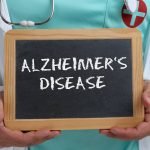According to Alzheimer’s Disease International, there are approximately 18 million people around the world with dementia at the present time. This number, unfortunately, is only heading up, with an expected jump to 34 million by 2025. But now researchers have found a link between hearing loss and dementia that could spark new methods of prevention and treatment over time.
Scientists at Johns Hopkins University in Baltimore, Maryland have shown that the worse a person’s untreated hearing impairment is, the greater their risk of developing dementia.1 It is not necessarily that the hearing loss directly causes the dementia, but the two conditions certainly seem to be independently associated.
There were more than 600 participants in the study, both men and women between the ages of 36 and 90 who were followed over an average of 12 years. At the start of the research, none of the volunteers had been diagnosed with dementia. All of them underwent hearing tests, and just under 30 percent were found to have some hearing loss.
During the period of the research, 9 percent of the subjects developed dementia. Those with a mild amount of hearing loss, who might have trouble following a conversation in a noisy atmosphere, had almost twice the risk of developing dementia as compared to those with no hearing loss. For those with moderate hearing loss, who may experience difficulty keeping up with a conversation even in a quiet setting, that risk was three times greater. And for those with severe hearing loss, who typically must rely heavily on lip-reading, the risk was five times higher.
Though the connection between hearing impairment and dementia has now been demonstrated, the researchers are not sure as to exactly why it exists. One possible theory is that a brain abnormality is responsible for both hearing loss and dementia. Other thoughts are that senior citizens with hearing loss have a harder time coping with cognitive decline, or that social isolation due to untreated hearing loss encourages dementia. More research will certainly be needed to determine whether any of these can be established as the cause and in some way be altered to delay or prevent the onset of dementia.
In the meantime, as we age it is clearly important to get our hearing tested regularly and use hearing aids if necessary. But there are other things we can do as well to keep dementia at bay. Smoking has been linked to a tremendously increased risk for developing dementia in later years. Compared to nonsmokers, those who smoke two packs of cigarettes a day during middle age face a 157 percent increased chance of developing Alzheimer’s disease and a 172 percent greater risk of developing vascular dementia.
Staying heart healthy is also essential since cardiovascular disease reduces the flow of oxygen and nutrients to the brain due to restricted arteries. And the same factors that cause inflammation of arterial tissue also cause inflammation to areas of the brain. Making dietary changes such as avoiding heavy consumption of saturated fats and transfatty acids will help combat this. Inflammation can be reduced by supplementing with Omega-3 fatty acids and taking a systemic proteolytic enzyme formula. And the use of L-carnosine based formulas has been specifically proven to reduce or completely prevent cell damage caused by beta amyloid, one of the prime protein risk factors for Alzheimers.
Exercise, which is of course beneficial to people of all ages and has been shown to keep the elderly healthy in many ways, can help us mentally as well as physically. Regular aerobic exercise improves oxygen flow to the brain, and stretching workouts open up circulation to every area of the body.
And don’t forget about giving your mental faculties frequent workouts too. Thinking exercises that challenge the mind can make a huge difference. Playing bridge, chess, or a musical instrument all help. Studies have shown that people who do four crossword puzzles a week have a 47 percent reduced risk of Alzheimer’s disease — or at least delay its onset for a number of years. So keep yourself active — brain and body — to stay clear and focused well into your senior years.
1 Lin, Frank R.; Metter, E. Jeffrey; O’Brien, Richard J.; Resnick, Susan M.; Zonderman, Alan B.; Ferrucci, Luigi. “Archives of Neurology.” Hearing Loss and Incident Dementia. February 2011. American Medical Association. 7 April 2011. <http://archneur.ama-assn.org/cgi/content/short/68/2/214>.











Hearing impairment has been
Hearing impairment has been hypothesized as contributing to symptoms of dementia. One possible theory is that a brain abnormality is responsible for both hearing loss and dementia. Other thoughts are that senior citizens with hearing loss have a harder time coping with cognitive decline, or that social isolation due to untreated hearing loss encourages dementia.
Dementia is a condition that
Dementia is a condition that affects brain function. There are various types such as Alzheimer’s and vascular dementia, they all have similar symptoms including memory loss, mood changes and communication difficulties. Generally patients with dementia will get worse with time. There will be a gradual deterioration in the person’s ability to carry out daily activities such as washing, dressing and feeding. Their ability to communicate becomes affected as they find it more difficult to talk, write and read.
I wonder how many cases of
I wonder how many cases of “dementia” are misdiagnosed due to hearing loss. When one can’t hear everything they need to, confusion is inevitable.
This happened with my mother. The label “dementia” was pinned on her in one hospital (with no dementia tests to back it up) when she was delirious due to pneumonia. That label followed her through the “health care” system until she died – in a “dementia” unit, where the care is less than ideal. I had tried to have it removed, but only the “doctor” who had misapplied the label could do this; and of course that one wouldn’t because it would mean admitting to a mistake.
If my comment helps just one person to question these hasty and uninformed diagnoses – in fact to question every unfounded assumption that “health care” practitioners make – my commenting will have been worthwhile.